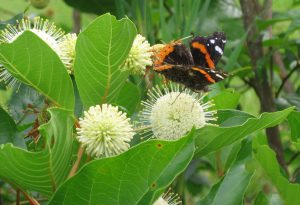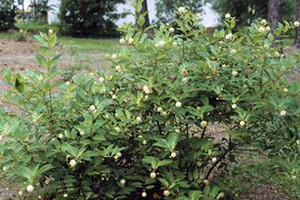 Beginning in 2007 the US Senate, in support of the North American Pollinator Protection Campaign, declared the last week of June as “National Pollinator Week.” As humans, we depend on pollen-moving animals for one out of every three bites of food. Without birds, bees, bats, beetles, butterflies, and various other animals, many flowers would fail to reproduce. In Florida there are numerous native plants that serve as hosts for these pollinators.
Beginning in 2007 the US Senate, in support of the North American Pollinator Protection Campaign, declared the last week of June as “National Pollinator Week.” As humans, we depend on pollen-moving animals for one out of every three bites of food. Without birds, bees, bats, beetles, butterflies, and various other animals, many flowers would fail to reproduce. In Florida there are numerous native plants that serve as hosts for these pollinators.
One of the favorites, due to its heavy flowering over the summer, is Buttonbush (Cephalanthus occidentalis).  It is a semi-aquatic woody shrub to small tree that develops white golf-ball-sized clusters of fragrant flowers, attracting various pollinating animals. Bees of various species, several different wasps, assorted moths and butterflies, flies and even hummingbirds scramble for the flowers’ sweet treat within each of the trumpet shaped flowers. The pincushion-like flower balls stand on two inch stalks in clusters arising from stem tips and leaf axils. They are produced over a long period in late spring and summer. The flowers give way to little reddish-brown nutlets which persist on the through the winter. Buttonbush seeds are important wildlife food, especially for ducks; and the dense, impenetrable tickets provide nesting and escape cover for many wetland birds and herptiles. Buttonbush is a fast-growing wetland plant that can be grown in a naturalized landscape if given supplemental water during dry spells. It is at its best, through, in an area where the soil is frequently wet and can tolerate soggy soils. Buttonbush is not drought or salt tolerant. The deciduous shrub grows well in full sun to partial shade on soils that are acidic to slightly alkaline. The leaves of Buttonbush turn yellow in the fall before dropping off. While short-lived, requiring rejuvenation pruning to improve its longevity, Buttonbush (Cephalanthus occidentalis) serves a critical role to wildlife in the wetland habitat. Deer browse the foliage and twigs. Ducks, especially the mallard, eat the seeds. And, the summer flowers attract bees, butterflies and moths; our wonderful pollinators.
It is a semi-aquatic woody shrub to small tree that develops white golf-ball-sized clusters of fragrant flowers, attracting various pollinating animals. Bees of various species, several different wasps, assorted moths and butterflies, flies and even hummingbirds scramble for the flowers’ sweet treat within each of the trumpet shaped flowers. The pincushion-like flower balls stand on two inch stalks in clusters arising from stem tips and leaf axils. They are produced over a long period in late spring and summer. The flowers give way to little reddish-brown nutlets which persist on the through the winter. Buttonbush seeds are important wildlife food, especially for ducks; and the dense, impenetrable tickets provide nesting and escape cover for many wetland birds and herptiles. Buttonbush is a fast-growing wetland plant that can be grown in a naturalized landscape if given supplemental water during dry spells. It is at its best, through, in an area where the soil is frequently wet and can tolerate soggy soils. Buttonbush is not drought or salt tolerant. The deciduous shrub grows well in full sun to partial shade on soils that are acidic to slightly alkaline. The leaves of Buttonbush turn yellow in the fall before dropping off. While short-lived, requiring rejuvenation pruning to improve its longevity, Buttonbush (Cephalanthus occidentalis) serves a critical role to wildlife in the wetland habitat. Deer browse the foliage and twigs. Ducks, especially the mallard, eat the seeds. And, the summer flowers attract bees, butterflies and moths; our wonderful pollinators.
- Sunshine in the Winter - December 20, 2024
- Helene’s Potential Impact on the Florida Coastal Wetlands - October 4, 2024
- April is Safe Digging Awareness Month - April 6, 2024
